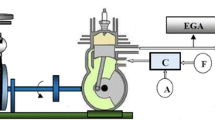Abstract
Exhaust emission and performance characteristics were evaluated in a Toyota van, powered by a 21 indirect injection (IDI) naturally aspirated diesel engine, operating on vegetable based waste cooking oil methyl ester (WCOME).
Tests were performed on a chassis dynamometer and the data were compared with previous results conducted on the same vehicle using mineral diesel fuel. The data obtained includes smoke opacity, carbon monoxide (CO), carbon dioxide (CO2), oxygen (O2), nitrogen dioxide (NO2), nitric oxide (NO), sulfur dioxide (SO2) and brake power. Engine lubricating oil samples were also taken. Results from this study indicated a difference of approximately 9% in brake power between the two fuels. WCOME developed a significant lower smoke opacity level and reduced CO, CO2, SO2 emissions. However, O2, NO2 and NO levels were higher with the vegetable oil based fuel. Power values were comparable for both fuels. Lubricating oil analysis gave little change of viscosity and wear metal concentrations after 2887km were: Silicon 35ppm, Chromium 3.3ppm, Iron 33.8ppm, Copper 14.1ppm and lead 78.6ppm.
Similar content being viewed by others
References
Ali, Y., Hanna M. A.: 1996, Beef tallow as a biodiesel fuel. Liquid fuels and industrial products from renewable sources. Proceedings of the 3rd liquid fuels conference. 15-17 September 1996. Nashville, Tennessee.
Graboski, M. S.and McCormick, L.: 1998, Combustion of fat and vegetable oil derived fuels in diesel engines. Prog. Energy Comb. Sci., vol. 24, pp. 125–164.
Mittelbach, M., Tritthart, P. Diesel fuel derived from vegetable oils, III: 1988, Emission tests using methyl esters of used frying oil. JAOCS, 65(7).
Murayama, T.: 1994, Evaluating vegetable oils as a diesel fuel. INFORM, 5(10).
Rice, B., Frohlich, A., Leonard, R. Bio-diesel production based on waste cooking oil: promotion of the establishment of an industry in Ireland: Sept. 1997, Teagasc, Oak Park Research Centre. ALTENER contract No.XVII/4.1030/AL/77/95/IRL. Final report.
Ryan III, T. W., Bagby, M. O.: 1985, Identification of chemical changes occurring during the transient injection of selected vegetable oils. 76th Annual AOCS Meeting. Philadelphia, May 5-9,1985.
Tahir, A R; Zafar Khan, M and Lapp, H M: 1989, Vegetable oil derivatives: fuel for diesel engines, Agricultural mechanisation in Asia, Africa and Latin America. 20(1), pp.69–72.
Yahya, A and Marley, S J.: 1994, Performance and exhaust emissions of a compression ignition engine operating on ester fuels at increased injection pressure and advanced timing, Biomass and Bioenergy 6(4), pp.297–319.
Author information
Authors and Affiliations
Rights and permissions
About this article
Cite this article
Gomez, M.E.G., Howard-Hildige, R., Leahy, J.J. et al. Emission and Performance Characteristics of a 2 Litre Toyota Diesel Van Operating on Esterified Waste Cooking Oil and Mineral Diesel Fuel. Environ Monit Assess 65, 13–20 (2000). https://doi.org/10.1023/A:1006446326210
Issue Date:
DOI: https://doi.org/10.1023/A:1006446326210




